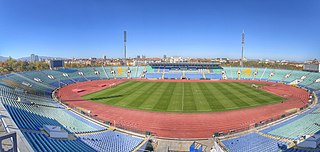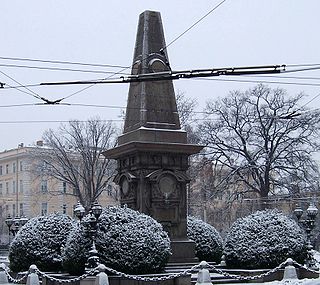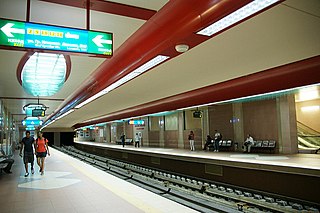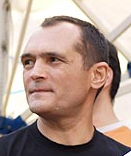
Vasil Levski, born Vasil Ivanov Kunchev, was a Bulgarian revolutionary who is, today, a national hero of Bulgaria. Dubbed the Apostle of Freedom, Levski ideologised and strategised a revolutionary movement to liberate Bulgaria from Ottoman rule. Levski founded the Internal Revolutionary Organisation, and sought to foment a nationwide uprising through a network of secret regional committees.

PFC Levski Sofia is a Bulgarian professional association football club based in Sofia, which competes in the First League, the top division of the Bulgarian football league system. The club was founded on 24 May 1914 by a group of high school students, and is named after Vasil Levski, a Bulgarian revolutionary renowned as the national hero of the country.

Karlovo is a historically important town in central Bulgaria located in a fertile valley along the river Stryama at the southern foot of the Balkan Mountains. It is administratively part of Plovdiv Province and has a population of about 19,373, the mayor being Dr. Emil Kabaivanov.

Vasil Levski National Stadium, named after Bulgarian national hero and revolutionary Vasil Levski (1837–1873), is the country's second largest stadium. The stadium has 43,230 seats and is located in the centre of Sofia, on the territory of the city's oldest and most famous park - the Borisova gradina. The Bulgaria national football team's home matches and the Bulgarian Cup finals are held at the venue, as well as athletics competitions. It was used as the home venue for Levski Sofia's Champions League games, and is often used for important derbies between the big clubs from Sofia, instead of their own home stadiums.

Georgi Asparuhov Stadium, nicknamed Gerena, is a multi-purpose stadium situated in the Suhata reka neighbourhood of the Bulgarian capital Sofia. Named after the legendary Bulgarian footballer Georgi Asparuhov (1943–1971), it has been the home ground of Bulgarian association football club Levski Sofia since its opening in 1963.

The Monument to Vasil Levski in the centre of Sofia, the capital of Bulgaria, is one of the first monuments to be built in the then newly liberated Principality of Bulgaria. It commemorates the hanging of Bulgarian national hero and major revolutionary figure Vasil Levski on the same spot on 18 February 1873.

The Eternal derby of Bulgarian football or simply The Eternal derby is the name of the local derby football match between the two most popular and successful football clubs in Sofia and Bulgaria: Levski Sofia and CSKA Sofia. The dominant forces in Bulgarian football have won 26 and 31 national championship titles and 26 and 21 Bulgarian Cup titles, involved into 13 and 11 Doubles, respectively. The rivalry was chosen by COPA90 as the 2nd Maddest Derby in Eastern Europe.

Vasil Levski Boulevard is a major boulevard in Sofia, the capital of Bulgaria. It lies between the Freight Station Square at the Slivnitsa and Danail Nikolaev Boulevards and the area of the National Palace of Culture. It is named after Bulgaria's national hero Vasil Levski.

Mikhailo Parashchuk was a Ukrainian sculptor who was active in Bulgaria from 1921 to his death in 1963 in Karlovo. Posthumously awarded the highest honor for Bulgarian culture: Order of Saints Cyril and Methodius.

Vasil Levski Stadium Metro Station is a station on the Sofia Metro in Bulgaria. It was introduced into service on 8 May 2009. It serves the Vasil Levski National Stadium and New CSKA Sofia Stadium. The architectural layout was created by architects Kr. Andreev and D. Mushev.

The 2003 Bulgarian Cup final was the final match of the 2002–03 edition of the Bulgarian Cup competition. It was the 21st consecutive Bulgarian Cup final match after the competition was established and 63rd national cup final overall.
The 1979 Bulgarian Cup final was the 39th final of the Bulgarian Cup, and was contested between Levski Sofia and Beroe Stara Zagora on 23 May 1979 at Vasil Levski National Stadium in Sofia. Levski won the final 4–1.
The Vasil Levski Monument stands in Vasil Levski Square in Karlovo, Bulgaria, between the churches of St. Nicholas and the Holy Mother. The foundation stone of the monument was laid on 15 May 1903, in front of prince regnant Ferdinand I. It was designed by the sculptor Marin Vasilev. The statue of Vasil Levski presents him with a revolver in his hand. By his side is a roaring lion, symbolising the nation of Bulgaria. In the lower part of the monument there is a list of Karlovo citizens, who died during the fight for Liberation of Bulgaria in July and August 1877. On the lower part of the pedestal there are three reliefs - "Creation of the revolutionary committee", "The arrest of Levski", and "Taking Karlovo's rebels from the konak".
The 1972 Bulgarian Cup final was the 32nd final of the Bulgarian Cup, and was contested between CSKA Sofia and Slavia Sofia on 12 July 1972 at Vasil Levski National Stadium in Sofia. CSKA won the final 3–0.

The 2016 Bulgarian Cup final was the 76th final of the Bulgarian Cup. The final took place on 24 May 2016 at Vasil Levski National Stadium in Sofia in front of 33,345 spectators. It was refereed by Stanislav Todorov, from Shumen.
The 1984–85 Bulgarian Cup was the 45th season of the Bulgarian Cup. CSKA Sofia won the competition, beating Levski Sofia 2–1 in the final at the Vasil Levski National Stadium in Sofia.
The 2017−18 Bulgarian Cup was the 36th official edition of the Bulgarian annual football knockout tournament. The competition began on 19 September 2017 with the first round and finished with the final on 9 May 2018. Botev Plovdiv were the defending champions, but lost on away goals in the semi-finals to Slavia Sofia. Slavia later won the final on penalties against Levski Sofia, thus acquiring its eight Bulgarian Cup in its history. The club also qualified for the first qualifying round of the 2018–19 UEFA Europa League.
The 2018–19 First Professional Football League was the 95th season of the top division of the Bulgarian football league system, the 71st since a league format was adopted for the national competition of A Group as a top tier of the pyramid and also the 3rd season of the First Professional Football League, which decides the Bulgarian champion. The season began on 20 July 2018 and finished on 30 May 2019. Ludogorets Razgrad became champions for the 8th consecutive time, on the final matchday of the season, with a 4–1 home win over Cherno More Varna.

Vasil Krumov Bozhkov is a Bulgarian politician and a businessman, considered the richest Bulgarian with a fortune estimated at between 1 and 3 billion Bulgarian levs. Known by the nickname The Skull, in internal correspondence of the US State Department he was described as "the most infamous gangster in Bulgaria."
Vasil Petrov is a Bulgarian professional football manager and former player who played as a defender. He currently work as Sporting Director at Fratria.














